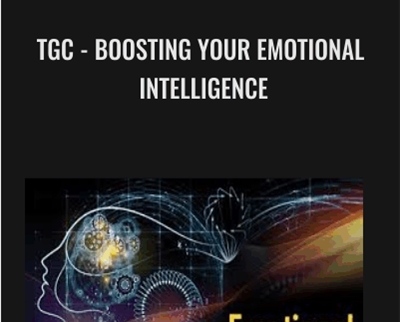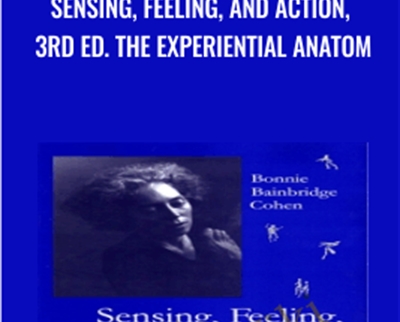Buy TGC-Boosting Your Emotional Intelligence – Professor Jason M. Satterfield Course at GBesy. We actively participate in Groupbuys and are committed to sharing knowledge with a wider audience. Rest assured, the quality of our courses matches that of the original sale page. If you prefer, you can also buy directly from the sale page at the full price (the SALEPAGE link is directly provided in the post).
 These are all exceptionally bright individuals with recognized talent in their fields. And yet each has failed to reach his or her own career, personal, or financial goals.
These are all exceptionally bright individuals with recognized talent in their fields. And yet each has failed to reach his or her own career, personal, or financial goals.
TGC-Boosting Your Emotional Intelligence by Professor Jason M. Satterfield,
Salepage link: At HERE. Archive:
We have all had experiences with people that prove that those with the highest IQs are not always the most successful. For example, you may have encountered the technology wizard who’s never been promoted because he isn’t a team player. Or the tenured professor who has no idea why her grown children avoid her. Or the award-winning designer whose temper has caused him lost clients and financial ruin. These are all exceptionally bright individuals with recognized talent in their fields. And yet each has failed to reach his or her own career, personal, or financial goals.
What are these very intelligent people missing?
Chances are, what’s missing is emotional intelligence—the ability to perceive, understand, and manage emotions in ourselves and others. Sounds very powerful, doesn’t it? Can we really manage our own emotions, as opposed to having our emotions run the show? Could we really effect change in the emotions of our coworkers or family members?
The answer to all these questions is a resounding “yes.” Emotional intelligence (or EQ) is a measurement bolstered by a powerful set of skills we can use to improve our quality of life and better meet our goals. As Professor Jason M. Satterfield of the University of California, San Francisco, explains in the 24 informative half-hour lectures of Boosting Your Emotional Intelligence, EQ is an invaluable ability that can be learned, practiced, and used with positive results.
Although emotions have been discussed and debated for millennia, emotional intelligence as a field of inquiry is relatively new, with the term itself first appearing in psychology literature less than thirty-five years ago. In this engaging course, Dr. Satterfield explores:
- Historic philosophical and scientific understandings of emotion
- The current definition of emotions and the purposes they serve in our lives
- Whether or not any given emotion is inherently “good” or “bad”
- The cultural context of emotions
- The major models of emotional intelligence, their strengths and potential weaknesses, and which parts of each model we might best use to understand our own emotions
- The most common ways EQ is measured and the reliability and validity of each methodology
- The relationship between emotional intelligence and social intelligence
- The newest technological tools intended to increase EQ.
The Impacts of Your Emotions
Whether or not you understand your emotions and their resultant behaviors, they leave their impacts like footprints all over the situations and people with whom you interact throughout your life. If your emotions are constantly running wild and you are hypersensitive to every personal interaction, coworkers might try to avoid your predictable high-energy chaos. If your emotions are shut down tight and rarely see the light of day, friends and partners might eventually stop trying to connect with you on the most personal and intimate levels. You might not be aware of what’s happening in those relationships and what’s causing people to back away from you—but you are impacted by their behavioral choices nevertheless.
In addition, your emotions impact your own cognition, decision-making, and physical body every day. Have you ever been nervous before an academic test or performance review and felt “butterflies” in your stomach? Have you ever felt so surprised or fearful that you “couldn’t think straight?” Or so happy that your physical pain seemed to lessen? In this course, Dr. Satterfield explains the many complex interactions and feedback loops between our emotions, physical body, and cognition.
Learning About Your Emotions
Emotions are visceral experiences. In fact, by definition, they involve whole-body changes in our subjective experience, behavior, and physiology. Since the best way to learn about emotions is to involve as many senses as possible, Dr. Satterfield illustrates his material with a variety of appealing and helpful images, movie clips, and other videos.
In particular, we have the opportunity to watch the development of EQ in action as Dr. Satterfield interacts with three “patients” at many points during this course. We learn from his conversations with:
- Carol, a 31-year-old who is learning emotion regulation in order to successfully meet her goals with respect to a new job and her first serious boyfriend
- Michael, a 51-year-old partner in an architectural firm who is using executive coaching to improve his work performance
- Maria, a recently widowed 71-year-old who wants to better manage her grief and move forward with her life.
How Did I Get This Way—and What Now?
Were you born with the emotional make-up you have today or did you develop it over time? To help you understand the history of your personal EQ, you might want to think about it the same way you think about your athletic ability.
Just as some children seem to be born with a natural athletic ability or more easy-going personalities, some aspects of emotional intelligence are inherited. For example, research has shown that approximately 20 percent of adult Americans have a genetic mutation that makes them inherently less anxious. But no matter your genetic makeup, childhood experiences also play a role. Did your caregivers take you outside to play catch or did they sit you in front of the TV all day? As your EQ was developing, did your parents encourage you to express yourself? Or did they fly off in a rage and then tell you what you should and should not be feeling? Did you have a school coach who helped you learn the correct way to throw a ball? A counselor who helped you understand and overcome your fear of social situations? Each of those factors helped shape your adult abilities and habits—and your EQ.
Fortunately, however, this is where the analogy ends. Because while it might be just a bit too late for you to become a football star, it is never too late to improve your life by improving your EQ. In Boosting Your Emotional Intelligence, you will learn:
- How to identify and monitor your own emotions
- How to choose which emotional responses you might want to change to better meet your personal goals
- A variety of techniques and skills to help you regulate your own emotions
- How to identify and monitor emotions in others
- When and how to best influence emotions in others
- A step-by-step process for building your own interactive Skills Tracker to improve your personal EQ
- Where to find numerous online resources to test, model, and improve your EQ as an ongoing, unlimited learning experience.
With the tools and skills you gather from this exciting, interactive course, you will be able to improve your emotional intelligence now and throughout your life—using your emotions as you want, to help reach your own personal goals.
Hide Full Description
24 lectures
| Average 31 minutes each
1. What Is Emotional Intelligence (EQ)?
2. Measuring EQ
3. Exploring Emotions
4. Embodied Emotions
5. Emotional Impacts
6. Perceiving and Expressing Emotions
7. Understanding Emotions
8. Managing Your Emotions
9. Managing Others’ Emotions
10. The Development of EQ
11. Emotional Intelligence Training
12. Social Intelligence
13. Intimacy and EQ
14. Interpersonal Conflict
15. EQ in the Workplace
16. Occupational Stress and Burnout
17. Leadership and EQ
18. Workplace Culture
19. Stress Management
20. Emotion Regulation Disorders
21. Behavior Change and EQ
22. Chronic Disease and EQ
23. Emotional Intelligence in Health Care
24. The Future of Emotional Intelligence
Buy the TGC-Boosting Your Emotional Intelligence – Professor Jason M. Satterfield course at the best price at GBesy.. After your purchase, you will get access to the downloads page. You can download all the files associated in your order at here and we will also send a download notification email via your mail.
Unlock your full potential with TGC-Boosting Your Emotional Intelligence – Professor Jason M. Satterfield courses. our courses are designed to help you excel.
Why wait? Take the first step towards greatness by purchasing TGC-Boosting Your Emotional Intelligence – Professor Jason M. Satterfield courses today. We offer a seamless and secure purchasing experience, ensuring your peace of mind. With our trusted payment gateways, Stripe and PayPal, you can confidently complete your transaction knowing that your financial information is protected.
Stripe, known for its robust security measures, provides a safe and reliable payment process. With its encrypted technology, your sensitive data remains confidential throughout the transaction. Rest assured that your purchase is protected.
PayPal, a globally recognized payment platform, offers an additional layer of security. With its buyer protection program, you can feel confident in your purchase. PayPal ensures that your financial details are safeguarded, allowing you to focus on your learning journey.
Is it secure? to Use of?
- Your identity is completely confidential. We do not share your information with anyone. So it is absolutely safe to buy the TGC-Boosting Your Emotional Intelligence – Professor Jason M. Satterfield course.
- 100% Safe Checkout Privateness coverage
- Communication and encryption of sensitive knowledge
- All card numbers are encrypted using AES at relaxation-256 and transmitting card numbers runs in a separate internet hosting atmosphere, and doesn’t share or save any data.
How can this course be delivered?
- After your successful payment this “TGC-Boosting Your Emotional Intelligence – Professor Jason M. Satterfield course”, Most of the products will come to you immediately. But for some products were posted for offer. Please wait for our response, it might take a few hours due to the time zone difference.
- If this happens, please wait. The technical department will process the link shortly after. You will receive notifications directly by e-mail. We appreciate your wait.
What Shipping Methods Are Available?
- You will receive a download link in the invoice or YOUR ACCOUNT.
- The course link always exists. use your account to login and download the TGC-Boosting Your Emotional Intelligence – Professor Jason M. Satterfield course whenever you need.
- You only need to visit a single link, and you can get all the TGC-Boosting Your Emotional Intelligence – Professor Jason M. Satterfield course content at once.
- You can do your learning online. You can be downloaded for better results and can study anywhere on any device. Make sure your system does not sleep during the download.
How Do I Track Order?
- We always notice the status of your order immediately after your payment. After 7 days if there is no download link, the system will automatically complete your money.
- We love to hear from you. Please don’t hesitate to email us with any comments, questions and suggestions.
![GBesy [GB] GBesy [GB]](https://www.gbesy.com/wp-content/uploads/2023/05/gbesy-Logo-full-100.png)


 Purchase this course you will earn
Purchase this course you will earn 





Reviews
There are no reviews yet.